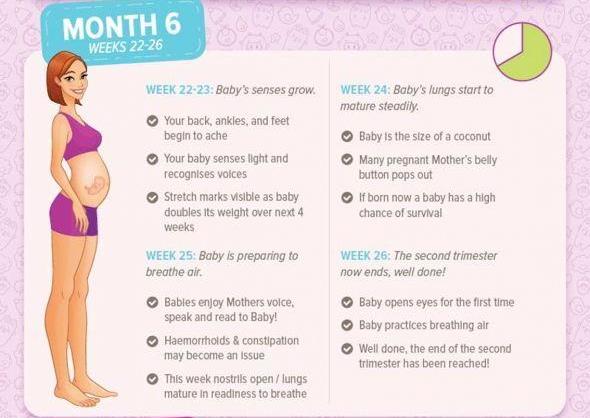

Everything You Need to Know About Being Six Months Pregnant
You're six months pregnant! Congratulations! This is the final month of your second trimester; after this, it's the home stretch. Let's talk about what you can expect at month six of pregnancy.
Key Points
- Your baby's skin is now covered in a fine, soft hair called lanugo.
- Your baby is generally too small at this stage to survive outside the womb, but with intensive care it may be able to if necessary.
- Your baby's taste buds are forming, and their bone marrow is producing blood cells.
Your Baby's Growth at Month Six
Your baby's skin is red and wrinkled and covered with fine, soft hair called lanugo. At this stage, the fetus is usually too small to be born; its lungs are too immature to sustain life outside its mother. If born now because of preterm labor, the fetus may possibly survive with intensive care. The eyelids begin to open this month. Fingerprints can be seen.
The fetus continues its rapid growth to a length of 11 to 14 inches long and a weight of about one and a half pounds by the end of month six. Your baby's taste buds are beginning to form, their bone marrow is making blood cells, and eyebrows and eyelashes are forming.
Your Body in Month Six of Pregnancy
You may feel your baby kicking strongly now. The skin on your expanding belly may start to itch. Your back may hurt; wear low-heeled shoes and take breaks by putting your feet up. Exercise can help prevent backaches. You may feel pain down the side of your belly as your uterus stretches.
If you experienced shortness of breath in previous months, it may start to improve in month six. Your breasts may start producing tiny drops of colostrum, which is early milk. You may begin experiencing Braxton-Hicks contractions in month six; these are painless contractions that the uterus undergoes to prepare itself for delivery. You should not be experiencing painful contractions at this stage; talk to your doctor if you are.
Prenatal Care at Six Months Pregnant
Visit your doctor or health care provider for your month six checkup. Continue eating a healthy, nutritious diet and take your vitamins. Talk to your doctor first before starting any nutritional supplements. Taken without the guidance of a medical professional, supplements can cause vitamin overdoses. Overdosing on vitamins can cause problems for you and your baby.
Low-intensity, low-impact exercise is great. Walking regularly can help you achieve your pregnancy exercise goals. Exercising while pregnant will help to improve your mood, and help to prevent you from losing too much weight. Talk to your doctor about how much exercise is appropriate for you during month six of pregnancy.
Avoid stress as much as you can. Excess stress is bad for you and for your baby. In extreme cases, stress can even cause a preterm delivery. Set boundaries for yourself; learning to say no is important. Establish boundaries within your personal relationships. If you find that your stress ever becomes unmanageable, talk to a mental health professional.
Now is a good time to start preparing for the arrival of your baby, if you haven't already. Start preparing their nursery and buying all needed supplies. Set a budget for yourself, and make a list of everything you need. If you haven't started thinking about what to name your baby, now would be a good time to start.
Do not take the content of this article as professional medical advice. It's important to exercise due diligence when obtaining relevant information in matters pertaining to your health. Always consult with your healthcare provider before making any medical decisions.